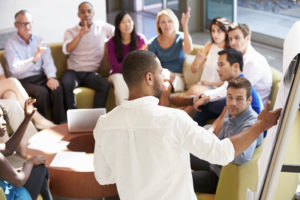 “[Community conversations are] like a huge brainstorming—
“[Community conversations are] like a huge brainstorming—
people walk away with ideas that they can literally use.”
The subtitle of Launching Inclusive Efforts Through Community Conversations is “A practical guide for families, service providers, and communities” and this resource is definitely practical, insightful, and full of useful examples other communities can use to set up, hold, and follow up on holding community conversations about inclusion in the community and school. As the guide’s opening quote states: “We can create the future we want to see by starting with the power and connections we have.”
Access the resource at | https://www2.waisman.wisc.edu/naturalsupports/pdfs/Community_Conversation_Guide.pdf
More Information about the Guide
What is a community conversation? Here’s part of the introduction that provides a good description: A “community conversation” is a way to bring a diverse set of community members together to collectively brainstorm strategies and resources that can be used to address a challenge facing the community. In short, it provides a fun and creative way to find local solutions and new partners to address issues that matter most in a community.
About the guide | The 40-page guide is easy to read, attractive to look at, straightforward in its structure, and loaded with checklists and other concrete information you can apply. Sections include:
- Getting started
- Organizing the event
- The art of facilitation
- After the conversation
Examples of topics | Topics for community conversations are up to the local community and the organizers of the event, but to give you an IDEA of possible topics, a few are mentioned in the guide:
- Access to general education classes and coursework
- Inclusion in extracurricular clubs and after-school programs
- Involvement in social events and relationship-building opportunities
- Meaningful work opportunities for youth or adults with disabilities
- Recreational and leisure activities
- Postsecondary learning opportunities
From the Natural Supports Project at the Waisman Center, a University Center for Excellence in Development Disabilities.

